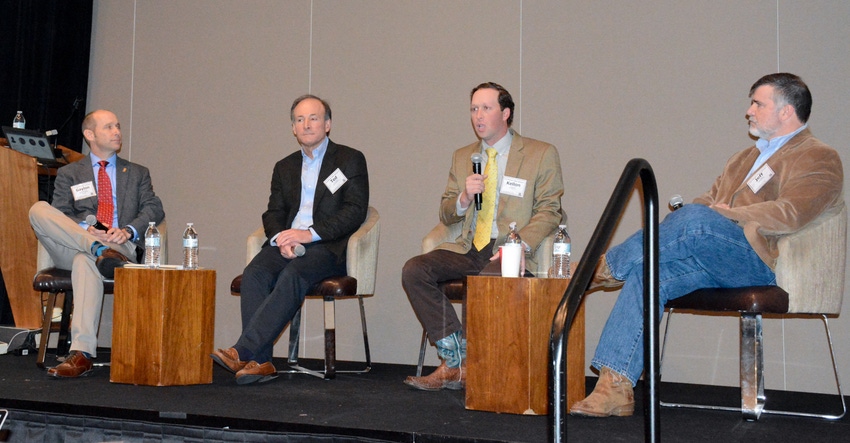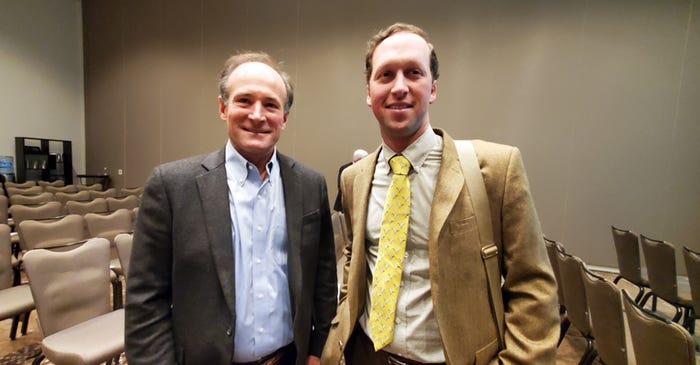
"It's not just about growing cotton," says Gaylon Morgan, panel moderator of "Grower Perspective on the Increasing Sustainability Needs of Brands and Retailers," at the 2020 Beltwide Cotton Conferences in Austin, Texas.
"We have to have a market for cotton. And the Fieldprint Calculator and U.S. Cotton Trust Protocol are ways to enhance that market opportunity," said Morgan, Cotton Incorporated's director of Agricultural and Environmental Research.
The sustainability panel included two Louisiana growers, Kellon Lee, from Tensas Parish, and Ted Schneider, from Lake Providence, along with Jeff Peters, senior manager of sustainability for Agrible, a company acquired by Nutrien Ag Solutions, that provides supply chain stakeholders with tools to meet sustainability goals and the data science to ensure accurate results.
Schneider, who also farms in Southeast Arkansas, is chair of the National Cotton Council Sustainability Task Force and Lee is a participant in the Field to Market pilot project.
See, Future technology expected to help remove guesswork in farming
Below are a few of the questions posed and some of the panelist's responses.
Question: What is your definition of sustainability?
Ted: The ability of present generations to meet their own needs without compromising the ability of future generations to meet theirs. I'm a third-generation farmer. There were two generations ahead of me who left me a very nice farm to work with. I've got the responsibility of having two generations below me and the definition of sustainability fits perfectly. I've experienced it on the receiving end and now it's time for me to give back to generations behind me.
Kellon: I'm a fourth-generation farmer in Louisiana, and like Mr. Ted said, it's staying in business and being good stewards of your land, being productive. All that is sustainability to me — making sure I can carry our operation to the next generation. That's the goal.
Jeff: When we talk about sustainability, it's more about survivability and necessity. So, when we look at market conditions and we look at weather conditions, growers are having to respond to this through efficiencies and a lot of these efficiencies, whether it's natural resource management or how you're managing your inputs or your time and your labor, all of that adds up.
But it also has to be economically viable. The numbers have to pencil out, otherwise you're going to have a tough row to hoe.

Louisiana growers Ted Schneider left, and Kellon Lee. Both participated in a panel discussion about the increasing sustainability needs of brands and retailers.
Question: It's been said, cotton is the leader in sustainability. How has that affected you and your operation over the lean years of farming?
Ted: Thirty-five years ago, I left a three-year career in banking and returned to the family farm. Agriculture across the entire country was abruptly leaving an economic boom and moving into a very abrupt depression. And if you didn't adapt and change and start limiting resources, doing everything you could to be efficient and produce more with less, you went out of business. And a lot of good farmers in the 80s went out of business.
So, you've got to have a mindset of continual improvement, which you'll hear a lot connected to sustainability, and it has to do with, as Jeff said, economic survival. We were practicing sustainability, we just didn't really know it at the time.
There are three legs to sustainability: environmental sustainability; social sustainability, which is treating your workers, your community and your neighbors correctly; and economic sustainability. If you don't have all three of those, you're not sustainable.
Jeff: For U.S. cotton producers today, if they weren't sustainable, they wouldn't be around. So, that's a given. Where the gap is, which was talked about this morning, is we need to be able to document and quantify and communicate that story. Communicating the story is the missing piece right now. So, we need that information. We need producers engaging on this topic.
Question: Ted and Kellon, could you provide some examples of how you've used either the Fieldprint Calculator or data management tools on your farm?
Kellon: I like to use my own farm as an example. I've been involved in Field to Market for three crops now. I'm working for Dr. Jordan (owner of Jordan Associates and the Field to Market 2019 Trusted Adviser of the Year) with this pilot project and I can see all the growers have an ID number that's anonymous to me, but I could see where they stand as far as their field imprint. And the first name I saw was my ID number and mine was the worst one. So, using Field to Market, using the data, being able to see that, I made some adjustments pretty quickly. It was beneficial as far as that goes. But it allows us to compare it to state benchmarks and national benchmarks as well. So, from a producer's standpoint, immediately being able to see where you stand as far as benchmark averages, that's insightful and for brands and retailers, it's being able to tell your story using this data.
See, Panel discusses sustainability demands for retailers/brands
Ted: It's a motivator. I'm like a lot of producers, I think I've been doing this about as well as I can. But there's always areas you can improve. And if I'm out of whack in one of the metrics then it makes me wonder why, and what I can do differently.
Question: How do you perceive the pressure from the consumer and/or retailers telling you that, 'Oh, you need to be more sustainable if you're going to have a market out there or we're not going to pay you for it?' How would you explain to growers or anyone else in this industry why they should get involved with the protocol or other efforts that prove sustainability?
Ted: I think this protocol and the whole sustainability arena is an opportunity to communicate better with the supply chain and consumers.
A lot of younger people get their news from social media. They don't know farmers anymore. This gives us a real opportunity to connect with our supply chain and with the consumer in a much more productive and positive way. We've got to take control of the narrative in our industry. We've let others define us for too long.
Kellon: I live in a very small community and I have my farm. Instead of just worrying about my crop and getting to the next year or focusing on just what we're doing, this makes us look at how what we're doing is impacting the market, instead of my one little niche.
Jeff: I would like to add to what Ted and Kevin said, it's important to be at the table shaping this topic because this is not a fad. This trend is growing. And Jesse Daystar, Cotton Inc., talked about some of the science-based targets that companies have in the next 10 years. These are real targets. So, it's important to be part of the conversation and to provide feedback and direction and guidance.
For more information, go to U.S. Cotton Trust Protocol. Click the link to learn more about Jordan and Field to Market and the Field to Market 2019 Farmer of the Year Rick Clark.
About the Author(s)
You May Also Like






